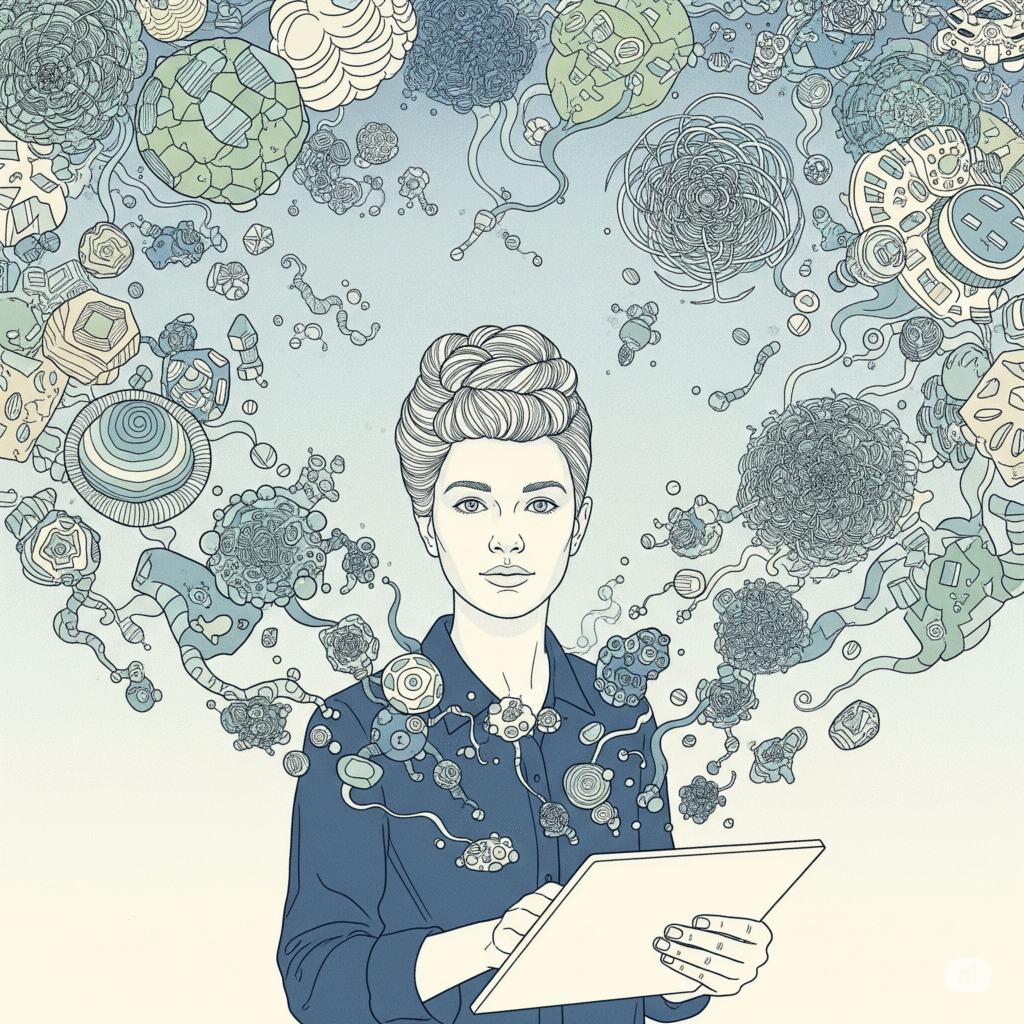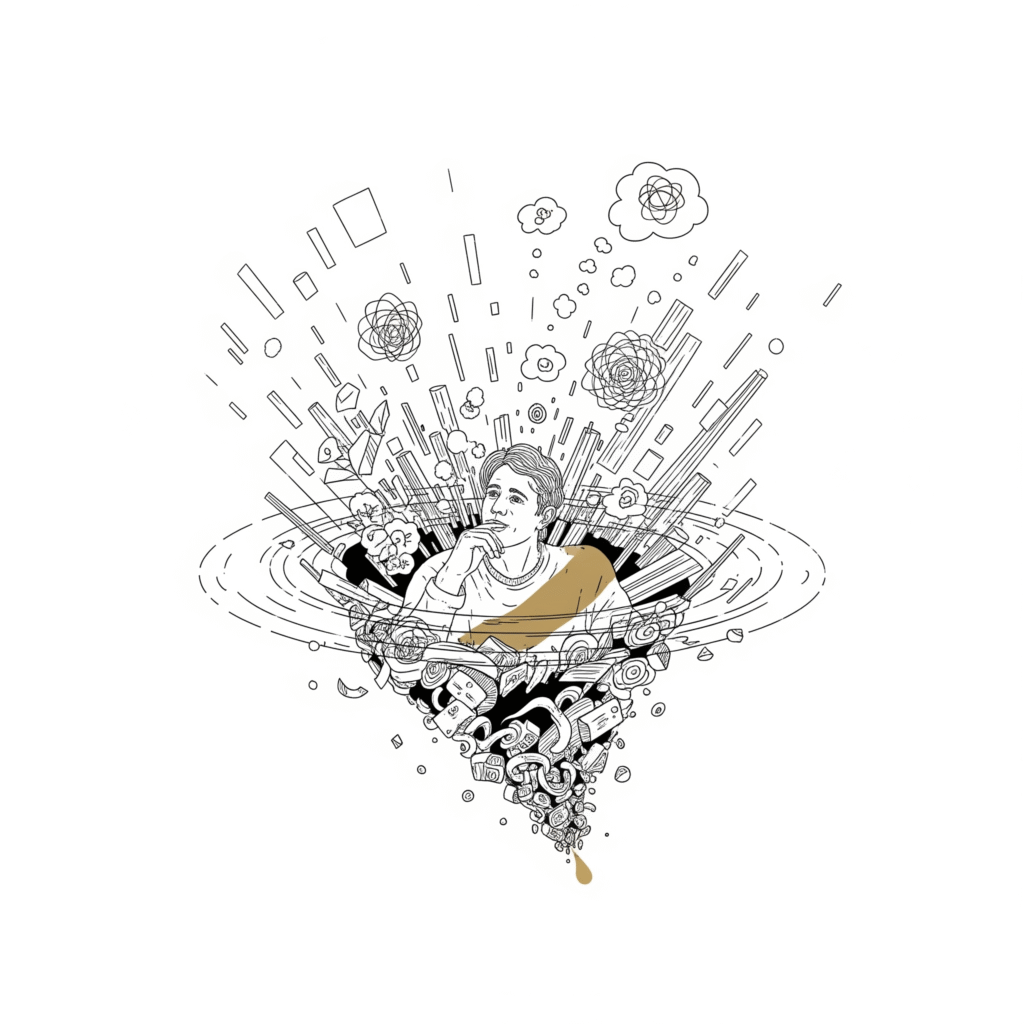What Is Creative Chaos?
Creative chaos in this context refers to the state where creative people struggle with crowded, random, and disorganized ideas. This state of chaos -even though it may seem to some people otherwise- is a vital part of the creative process.
In this series, chaos is not merely confusion or mental distraction, but rather a reflection of the dynamic and ever-evolving nature of the creative mind. While this state of mind fosters innovation, it can also be confusing and risky.
Individuals might find it difficult to focus on a single idea, leading to incomplete projects. However, understanding the importance of such chaos and how to manage is the key to true creativity.
The following instances and contexts show how important is this state of mind:
Generating New Ideas:
The number one reason why it’s good to have such chaos is the fact that it opens the door wide to new ideas. It allows our mind and wild imagination to connect ideas that seem unrelatable because we set free that chaos and let it work.
Transcending the Analytical Mind:
In some cases, an overemphasis on organization and order might cause you to get stuck in details and block your mind from seeing the bigger picture. In such cases, creative chaos can encourage thinking “outside the box” and free your mind from analytical constraints that can hinder creativity.
Fostering Mental Flexibility:
Sometimes when our mind operates in chaos, it becomes more flexible and adaptable to changing ideas. That can force us to adapt to new challenges and think of creative solutions to problems, which increases our ability to deal with ambiguity and uncertainty.
Accelerating Innovation:
Innovation requires constant challenges to traditional and familiar ideas and models. This cannot be done through the “organized” way of thinking. Innovative and extraordinary solutions will only arise by allowing the chaotic state to interact with these traditional ideas.
Enriching the Creative Process:
Creative chaos can contribute to enriching the creative process by providing a collaborative environment for our ideas. I believe people with creative minds can take advantage of the flow of random ideas and transform them into tangible concepts through gradual organization. In other words, chaos is an essential first step before reaching the stage of organization and production.
How to Manage Creative Chaos
Here are two ways to manage this state of creativity:
Embrace creative chaos:
We need to understand that chaos is not the obstacle to our success, it is rather our partner. Therefore, thinking about eliminating it is not the right thing to do. By accepting it, we can transform the tension resulting from overlapping ideas into an opportunity for creativity and renewal.
Organize ideas carefully and gradually:
We can transform chaos into order by using techniques like mind mapping, free writing, and many other tools that we will discuss later in this series. This process is one of the key concepts of this series. All ideas matter, but some should be on the top of our list. The ability to organize these ideas according to their importance is what distinguishes true creative minds.
Understanding the Nature of Ideas
While ideas are often seen as just the spark or the inspiration, in the context of this series, they are more than that. Think of them as living organisms that can change and evolve. Ideas are not static and do not suddenly take shape in their final form. Rather, they are in constant motion, growing, transforming, and adapting to their surroundings and circumstances.
Ideas are normally formed through mere observation, a personal experience, or even from ordinary conversation. However, an idea at that moment might not be fully formed. Each idea begins as a small granule of knowledge or wonder and then begins to grow as we connect it to other old ideas or past experiences. For example, a simple idea may overlap with another idea in a completely different context, giving birth to a new idea.
You should know that an idea requires a good environment to develop. This can be done through sharing it with “the right people”, documenting it, or simply contemplating it regularly. Additionally, ideas thrive when we remain open-minded and refrain from putting constraints on them.
We can think of ideas as an ecosystem. This system is where all the elements interact and impact each other, creating an entirely new yet complete concept.
What are the Signs of Mental Fatigue?
When ideas are flowing non-stop, it may seem at first glance to be a sign of abundant creativity. However, this abundance can turn into severe mental fatigue that is difficult to deal with. The prevailing idea that having more ideas means more productivity can be misleading because the accumulation of ideas without a clear structure can lead to a state of internal chaos and exhaustion.
What is Idea Overload?
Idea overload is when creative people face a large number of ideas at once, without a clear way to organize or prioritize them. This disorganized flow can become exhausting when you feel that you are unable to control it. Below are some signs of idea overload:
Feeling constantly distracted:
One of the most prominent signs that indicate mental fatigue is feeling constantly distracted. You may find yourself unable to focus on one idea because whenever you start thinking about something, new ideas rush in and distract you.
Inability to make decisions:
It is a state where your ideas multiply in a way that makes you unable to make any decisions. If we compare it to a race, the ideas (competitors) all seem like winning, losing, or at the same ranking, leaving you unable to decide which to prioritize or to take or leave. This state can also cause confusion which will lead to procrastination.
Feeling under constant pressure:
One of the things that can hinder your success is the feeling that every idea is important now. Therefore, you feel the urge to implement them all at once. This happens when you are fully focused on one idea, but a new idea appears, and you feel additional pressure to implement it. This can put you in a constant state of mental and physical stress.
Although some ideas may be inspiring, the pressure to implement them can become an unbearable burden. For example, if you are building a website, you have a set of checklists that you will finish. However, later in the process, you realize that you need to create social media profiles as part of the main website outreach or many other related pages. This can cause additional stress and pressure if you don’t stay focused on the main goal.
Declining productivity:
Despite the abundance of ideas, you may find that your actual productivity declines. Although you are busy thinking all the time, these ideas may not find their way to practical implementation. Additionally, you may start completing fewer projects because you are distracted by too many ideas without finishing any of them.
Frequent procrastination:
One of the natural consequences of idea overload is procrastination. When faced with too many ideas without a clear order, you may find yourself putting off starting any of them, because you don’t know where to start or how to deal with this overwhelming number of ideas.
Loss of enthusiasm:
Although new ideas usually bring enthusiasm, the chaos that accrues from the accumulation of ideas can lead to a loss of enthusiasm. You may feel frustrated because you are unable to turn these ideas into reality, and over time, this feeling of frustration may start to extinguish your spark of creativity.
Situations that indicate idea overload:
If you always find yourself working on several projects at the same time without finishing any of them, this is an indication that you are suffering from idea overload. Whenever a new idea comes up, you start to switch to another project without finishing what you started previously.
When you feel that your life is full of stress, whether at work or in your personal life, thoughts may start to increase excessively, which increases the state of stress and exhaustion.
Are you a Creative with a Graveyard of Unfinished Projects?
Get Our Book On The Art of Completion
Learn How Writers and Creatives Can Finish What They Start.
This book is the essential guide to overcoming the universal struggle of creative incompletion. It contains a practical and empathetic roadmap for turning your ideas into a finished reality.



